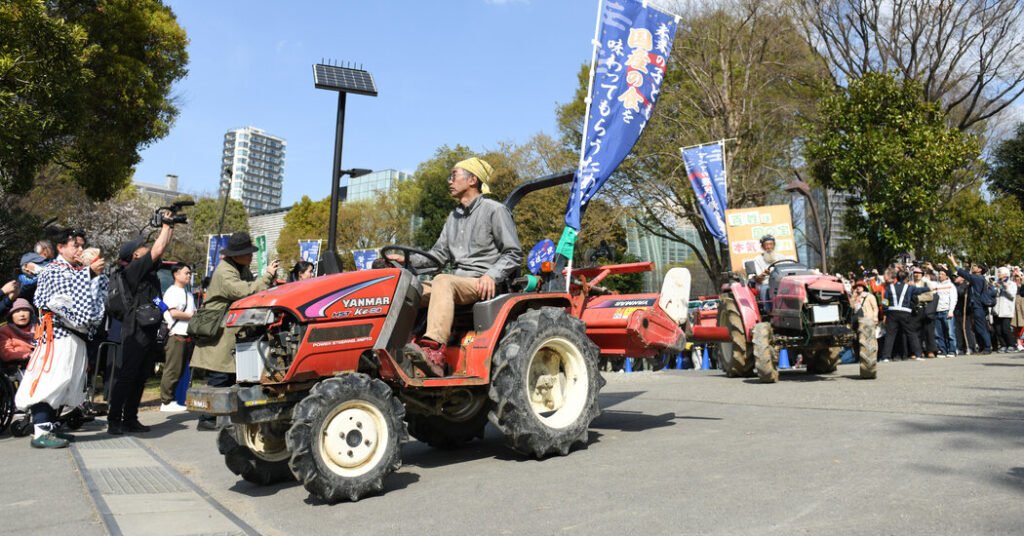In the United States, the affordability of eggs has prompted a national discussion — underscoring anxieties about the economy and the government’s role in addressing them. In Japan, there’s an equivalent: rice.
Over the past year, Japan has grappled with a more than 200,000-ton shortage of its staple grain. Rice prices have skyrocketed, and supermarkets have been forced to restrict amounts that shoppers can buy. The situation became so dire that the government had to tap its emergency rice reserves.
The twist is that even as Japan deals with shortages, the government is paying farmers to limit how much they grow. The policy, in place for more than half a century, consumes billions of dollars a year in public spending.
Farmers exasperated with the government regulations protested on Sunday. Under cherry blossoms in a park in central Tokyo, more than 4,000 farmers, wearing straw hats and sun caps, gathered with signs declaring “Rice is life” and “We make rice but can’t make a living.” Thirty of them drove tractors through the skyscraper-lined streets of the capital city.
The ability of Japan to manage its rice problem may have significant implications for the country’s political and economic landscape in the months ahead.
Last month, fresh food inflation surged 19 percent, driven by an 81 percent rise in the price of rice. Anxieties over the cost of food and other staples have weighed on Japanese consumers, and the economy, as households cut back on spending.
Shortages of Japan’s staple food are also occurring before an upper house election — expected in July — that will be the first nationwide poll for the prime minister, Shigeru Ishiba. His predecessor resigned last August, facing dismal public approval ratings caused in large part by the cost of basic goods.
The rice shortages stem from a mix of factors, including record summer heat in 2023 that damaged the harvest and a surge in tourism that has led to increased rice consumption.
But experts say the root cause lies in a decades-old policy that has systematically reduced arable land for rice growing. Since the 1970s, Japan has subsidized farmers to curtail the production of rice. The goal, officials say, is to support farmer incomes by maintaining high prices.
Farmers at the protest on Sunday said that policy isn’t working.
In 2022, the average earnings of rice farmers was around $23,000, according to statistics from Japan’s agriculture ministry. That level of income hasn’t been enough to attract young farmers, leaving the industry rapidly aging and shrinking by tens of thousands of workers each year.
“If things continue in this way, our farms will disappear. The products that we produce will disappear,” said Yoshihide Kanno, 75, a rice farmer from a prefecture north of Tokyo, and one of the leaders of the demonstration. “Before that happens, we need to change Japan’s misguided agriculture policies.”
Over the past five decades, Mr. Kanno said, about a third of the rice paddies in his town have been abandoned. “Why do we have to reduce production when there are shortages and fields available?” Mr. Kanno asked. “If my son and grandchildren are to continue farming, there needs to be a longer-term outlook.”
Japan has continued to adhere to a policy of limiting rice production to keep prices high, in contrast with the United States and the European Union, which have instead adopted systems that allow farmers to produce as much as they want while subsidizing them for price-related losses.
Adopting a similar policy in Japan would cost the government about $2.65 billion per year, compared with the $2.32 billion currently being spent on encouraging farmers to cut production, according to calculations by Nobuhiro Suzuki, a professor at the University of Tokyo specializing in agricultural economics.
While slightly more costly, a policy focused on expanding production would increase rice supply, enhancing Japan’s food security, while lowering prices for consumers, Mr. Suzuki said. Enabling farmers to grow without restrictions while backstopping their incomes would also make the industry more attractive to new generations of workers, he said.
There are many theories why rice production-reduction policies have prevailed. Mr. Suzuki suggests it stems from a broader austerity trend within the Japanese government, making it challenging to justify even marginal increases in agricultural spending. Others suggest that some level of pork-barrel politics may be a factor.
A spokesman for Japan’s agriculture ministry said that, “like with anything else,” the government promotes producing a level of rice that aligns with demand projections.
Historically, debates in Japan over agricultural policy have spurred political shifts. In 2007, a key factor in the brief ouster of the Liberal Democratic Party — which has held power almost continuously since its founding in 1955 — was the opposition party’s advocacy for doing away with policies reducing rice production.
For now, what is clear is that until agricultural policy undergoes fundamental reform, the problem of rice shortages will persist, said Mr. Suzuki, the professor at the University of Tokyo. That means, he said, heading into the summer elections, “the anger of farmers and citizens will continue to rise.”

